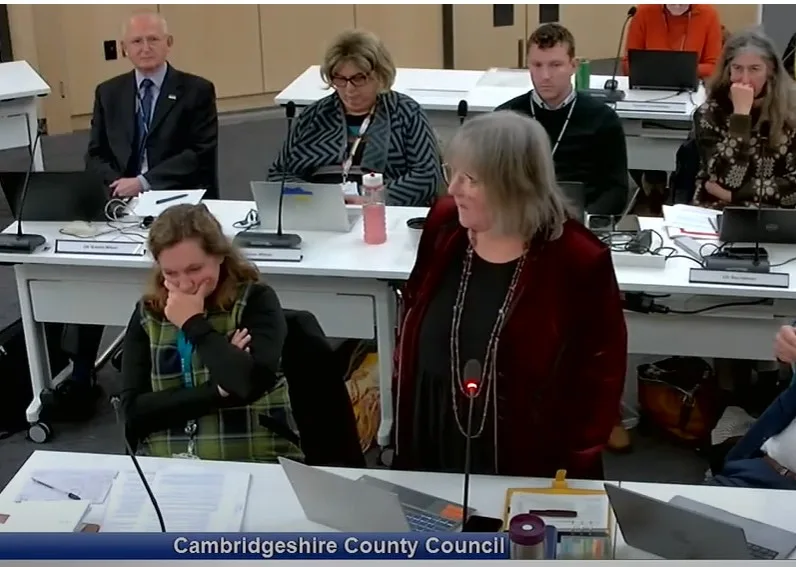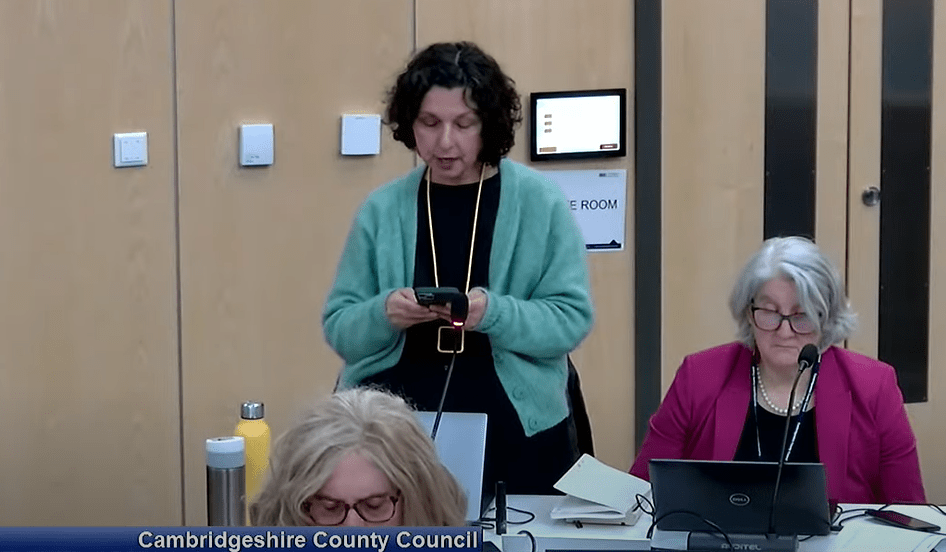Cambridgeshire County Council is looking at whether it can ditch a French company that supplies its electricity in favour, at least partially, of ‘home-produced’ power.
The council says that as “both a consumer and also a generator” this could be the ideal time to consider opting out of a contract with Total Energies that expires next year.

The county council consumes around 20 gigawatt-hours (GWh) of electricity per year, at an annual cost of approximately £3.5m in 2021-22.
But this cost is likely to be significantly higher in 22-23 and 23-24 onwards, rising to perhaps £8m a year by 2024.
Steve Cox, the council’s executive director of place and sustainability, set out options in a report to the strategy and resources committee.
He said the council owns a solar farm already in operation and has further solar generation assets in development.
“It may be possible to match some of the volumes of electricity exported and sold from its generation assets (such as solar farms), against part of what is purchased through our incoming supplies from the grid,” he said.
“This may or may not offer cost advantages, and further work is in progress with the finance, procurement, and energy teams to establish whether this option is worth pursuing.
“In any case, a supply contract would still be required, since the volumes bought and sold at different times would not match exactly.”
He added that energy efficiency and reducing energy consumption will still have a key role to play, whichever procurement option is selected.
Concerns over the carbon credentials of Total Energies is also among reasons why the council has deferred a decision on how it will source its electricity.
The committee was told that energy is traded on wholesale markets up to 18 months in advance which is why a contract starting from October 2024 needs to be signed so far in advance.
Total Energies, a French multinational oil and gas company, has held the council contract since 2016.
The council says a reason for postponement is to also consider greener opportunities and to have a supply that demonstrates a commitment to tackling the climate emergency.
The council was offered four different options for contract renewal but has postponed a decision to explore possibilities, such as using its own North Angle solar farm at Soham which is due to become operational later this year.
North Angle solar farm is expected to generate around 40 GWh per year, which is more than twice as much electricity as the council uses at all of its other sites combined.
A report by Mr Cox explained that electricity in future years is very uncertain given the likely reductions the council is implementing as part of its climate change strategy and commitment to reach net zero by 2045.
“These include a replacement programme of streetlights to LED, the council’s move to electric vehicles, and the ability to ‘net off’ the energy that council generates itself or is planning to do so in the future,” he said.
The council is responsible for electricity bills of around 200 supply points including offices, libraries, community centres and other buildings, plus street lighting, feeder pillars and traffic signals – but not schools.
Cllr Lorna Dupre, chair of the environment and green investment committee, said: “The council is committed to doing the right thing for the environment.
“By using its purchasing powers along with its renewables investment could help shape the new energy system we all need.”
Mr Cox said: “The UK and global energy markets have been very volatile recently, especially since the Russian invasion of Ukraine in February 2022, with prices often reaching record highs.
“Wholesale electricity prices have been driven further up due to a series of reasons, including sanctions on Russian oil and gas, and operational issues at key pipelines, interconnectors, and power stations.
“Electricity prices are also influenced by demand (varies with weather), European gas storage levels, renewables output, and global economic factors as well as UK policy. Therefore, it is very difficult to predict future prices now. “
But he estimated that overall, the council could be looking at a total contract value over four years of around £25.
“However, sensitivity analysis on changes to either prices or usage (or both) means that the likely range is from £3.2m to £8.5m per year, and a contract value of between £15m to £31m,” he said.
FACT FILE
Total Energies is a French multinational publicly-traded oil and gas company, whose businesses cover the entire oil and gas chain, from exploration and production to power generation, transportation, refining, marketing and trading.
They employ over 100,000 people (2,353 in the UK) and had annual revenues of over US$184 billion in 2021.
Total Energies state on their website that their aim is to reduce their share of petroleum products and “increase natural gas, as a transition fuel, and renewable electricity”. (Natural gas is lower carbon than oil but is still a fossil fuel.)
In 2021, 44% of Total Energies’ sales were from petroleum products (down from 65% in 2015) and 48% were from natural gas (up from 33% in 2015).
FACT FILE 2
Cambridgeshire County Council could decide to go ahead with a procurement on its own to contract with a supplier directly.
The advantage of that approach would be that the council could define the contract scope itself and would have full control over the specification.
However, this would necessitate running a full compliant procurement process in-house, which would require significant in-house expertise, not only in procurement but also in the energy markets and would be time and resource intensive.
Councillors have been advised that “it is vital to get the scope and specification of such a contract right”.
They would have to consider energy markets, trading strategies, metering, Automated Meter Reading, Meter Operator services, site works, data provision, billing platform and more.
Council officials say they do not currently have the expertise in-house to trade on wholesale energy markets directly.
FACT FILE 3
North Angle Solar Farm: Work started in 2021 on this 180-acre solar farm with 39MW capacity.
It will generate enough electricity to power 12,000 homes, saving 90,000 tonnes CO2 emissions over the 25-year project lifetime.
Biodiversity will be enhanced by a community green space, planting of species rich grassland and fruit trees, and over two kilometres of new hedging and woodland to help screen the solar farm.
The council is investing £26m in North Angle Solar Farm.























